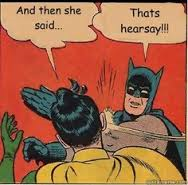
In this case, the Court made a statement on when failure to deny an allegation, which might otherwise be excluded under the rule against hearsay evidence, can be treated as evidence that the allegation is true:
21. Thus, analysing whether a failure to respond in the face of an accusation can amount to a declaration against interest must depend upon a myriad of factors. What follows cannot be definitive but merely indicative: an analysis of the nature of the relationship between the parties is essential; the circumstances under which an allegation is made must be taken into account, what is solemn, being different from what is social and from what is jocular or mischievous; the nature of what is claimed may amount, on the one hand, to a bare allegation or, on the other, to an apparently definitive statement backed-up by documentary proof; but finally, the test must be that a failure to respond, in circumstances when a denial would clearly be required, would amount in terms of the conduct of reasonable people to an admission.
Background
Ulster Bank issued a letter of demand to O’Brien (and his co-defendants) seeking repayment of €900,000 provided under two loan facilities. O’Brien did not respond to the letter or repay the debt. The Bank issued proceedings seeking summary judgment, displaying the letter of demand. O’Brien submitted a defence that the Bank’s affidavit was grounded on evidence that was inadmissible under the rule against hearsay evidence. The Master of the High Court accepted that argument and dismissed the proceedings. The Bank appealed that decision.
High Court
As the averments in the Bank’s affidavit were similar in form and content to affidavits which frequently provided the courts with sufficient evidence to grant summary judgment, and as O’Brien had not denied that the debt was owed, Hedigan J overturned the Master’s order and granted the Bank summary judgment plus costs. O’Brien appealed that decision to the Supreme Court.
Supreme Court
Charleton J (here) held, firstly, although similar evidence was admitted in thousands of other cases that does not make it admissible: if it offends against the hearsay rule it must be excluded. However there is an exception to that rule provided for in the Bankers’ Books Evidence Act 1879. But banks are not the only entities that provide credit. Trust that money lent and goods delivered will be honoured by payment is necessary for industry to flourish; and it would be extremely odd if banks could admit details of their business records into evidence and other commercial entities could not also do so.
Secondly therefore, Charleton J conducted a review of the case law on the hearsay rule and concerning where failure to refute an accusation can be determined to be an admission of its truth. He determined that it is not a case that failure to deny an accusation amounts to an admission, but the “ancestral adage” “Is ionall toil’s éisteach” (silence can be, not must be acquiesence) comes closer, and he outlined some of the factors that a court must consider, [21] as quoted above.
In relation to this case, “the swearing of an affidavit and its service in court proceedings which make allegations that a sum is due, can be accepted in the absence of denial, where the form and the content of what is deposed to and the exhibits supporting it carry sufficient indications of reliability”. He therefore dismissed the appeal stating that the judgment by Hedigan J in the High Court cannot be said to be in any way at fault. MacMenamin J issued a concurring opinion (here), as did Laffoy J (here).
